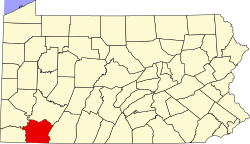Washington Township, Fayette County, Pennsylvania
| Washington Township | |
|---|---|
| Township | |
 Location of Washington Township in Fayette County |
|
 Location of Fayette County in Pennsylvania |
|
| Country | United States |
| State | Pennsylvania |
| County | Fayette |
| Area | |
| • Total | 9.88 sq mi (25.59 km2) |
| • Land | 9.71 sq mi (25.14 km2) |
| • Water | 0.18 sq mi (0.46 km2) |
| Population (2010) | |
| • Total | 3,902 |
| • Density | 402/sq mi (155.2/km2) |
| Time zone | EST (UTC-4) |
| • Summer (DST) | EDT (UTC-5) |
| Area code(s) | 724 |
| Website | Official website |
Washington Township is a township in Fayette County, Pennsylvania, United States. The population was 3,902 at the 2010 census, down from 4,461 at the 2000 census.
Arnold City, Fairhope, Lynnwood, Gillespie, Naomi and Brownstown are communities in the township.
A significant part of the prehistory of Washington Township is the Locus 7 Site, located north of Fayette City, where it is believed that members of the Monongahela tribe may have lived as far back as AD 600.
Washington Township is an original Fayette County township, created from Rostraver Township when Fayette County was erected from Westmoreland County in 1783. It originally included Perry and Jefferson townships.
Washington Township's most prominent historical figure is Colonel Edward Cook. Settling in what was then Westmoreland County, he was granted 3,000 acres (1,200 ha) and first built a small log cabin and a small store. In 1772, he began building his home (still standing today), the first stone building west of the Allegheny Mountains. Built entirely out of limestone from his property, it was finished in 1776.
Colonel Cook was among General Washington's personal friends and on two occasions at least entertained Washington in the old stone mansion. A local legend claims that on one of the occasions, Washington was journeying that way to visit his lands in Washington County and stopped at Col. Cook's for a brief rest. Cook was at that time engaged in reviewing a body of militia nearby and knew nothing of the arrival of his distinguished guest. Word of the arrival was whispered to the men before it reached the colonel, and when he observing the commotion learned what was in the wind, he relaxed all discipline and set off unceremoniously for the house. The militiamen followed at the double-quick and hurrahing enthusiastically for General Washington brought him to the porch and evoked from him in reply a good natured and fatherly speech which the soldiers cheered to the echo. There is no documented evidence, however, that this event occurred.
...
Wikipedia
